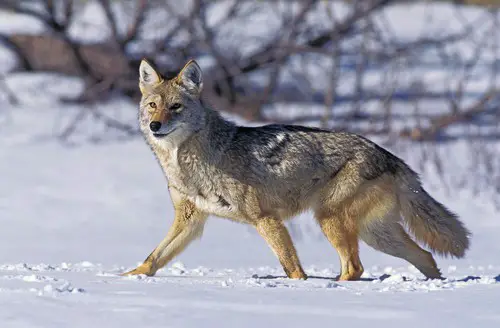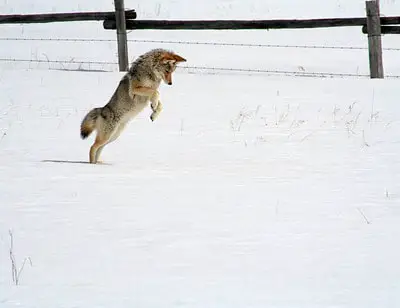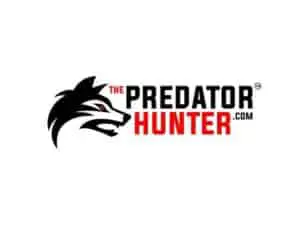Coyote hunting in Maine is growing in popularity, thanks to the ever-increasing size and numbers of eastern coyotes that call the state home. Check out this quick legal guide for hunting coyotes in Maine, but check for updates before you hit the Moose State’s open fields and woodlands.

Coyote hunting is allowed all year. A Coyote Night Hunting Permit (valid January 1 to December 31) and possession of a predator calling device (electronic, hand-held, or mouth-operated) are required to hunt coyotes at night (defined as 1/2 hour after sunset until 1/2 hour before sunrise).
Hunting coyotes in Maine.
Get a Maine coyote hunting license here.
Check out the Maine hunting seasons.
Related: Read the laws for hunting fox in Maine.
Related: Read the laws for hunting bobcats in Maine.
Is there a coyote hunting season? You can take coyotes at any time of the year. The exception is Sundays.
Sunday hunting is illegal in Maine. Coyote – While hunting coyote during the coyote night hunting season (December 16 to August 31) is legal from ½ hour after sunset to ½ hour before sunrise, it shall cease at midnight each Saturday and resume at 12:01 AM on Monday.
Is there a bag limit? No.
Bounties and coyote hunting contests in Maine. No Bounties awarded at this time. Contests permitted.
Are there any rules regarding possession? No rules if possessed by the hunter who took the animal.
Maine now allows the gifting of unregistered coyotes. A tag must be attached to each gifted coyote with the name and hunting or trapping license of the person who harvested the coyote, the harvest method (hunt or trap), harvest date, and harvest town. This information must be presented accurately to the tagging agent when the animal is registered.
Special notes for night hunting coyotes in Maine.
The use of artificial lights to hunt coyotes at night is permitted. The use of dogs to hunt coyotes at night is prohibited.
Can you use an electronic caller when hunting coyotes in Maine? Electronic calling devices are legal for deer, bear, turkey, moose, and coyote but are illegal for migratory game birds. Possession of a caller is required for night hunting coyotes.
Need to track a wounded coyote? Check out this article.
Looking to buy an entry level IR riflescope good for 200 yards? My favorite is available on Amazon (paid link).
Firearm laws for hunting coyotes in Maine.
It is Unlawful to Hunt with, or Possess for Hunting, Any:
- Automatic firearm (a firearm that continues to fire as long as the trigger is held back.)
- Auto-loading firearm (a firearm that reloads itself after each shot and requires a separate trigger pull for each shot) with a magazine capacity of more than 5 cartridges (plus 1 in the chamber for a total of 6), unless the magazine has been permanently altered to contain not more than 5 cartridges.
- Note: This provision does not apply to .22 caliber rimfire or smaller caliber guns or to auto-loading pistols with barrel lengths of less than 8 inches.
Silencers:
While a person no longer needs a permit from Warden Service to hunt with a suppressor device, anyone who wishes to possess a firearm fitted or contrived with any device for deadening the sound of the explosion must still obtain the appropriate federal permit from The Bureau of Alcohol, Tobacco, Firearms and Explosives (ATF).
Bullet Types:
It is unlawful to hunt with cartridges that contain tracer bullets or explosive bullets.
Cartridges:
- Firearms with .17 or .22 caliber rimfire cartridges may not be used for deer, moose, or bear hunting, except that .22 magnum can be used for deer hunting.
- Shotguns using shot loads cannot be used to hunt bear or moose.

Related: Interested in hunting eastern coyotes? Read this article on How to hunt Giants.
Loaded Firearms in Motor Vehicles
It is unlawful to have a loaded firearm or crossbow in or on a motor vehicle (including trailer, ATV, aircraft, snowmobile, or railway car), unless otherwise specified.
A loaded magazine may be carried in a motor vehicle, but it must not be inserted in or attached to a firearm.
Firearms may be transported in a motor vehicle without a concealed firearms permit provided they are (1) unloaded and in plain view, or (2) are unloaded and placed in a remote secure area (such as a locked trunk) away from the control of the occupants of the motor vehicle.
For the purpose of this law, a muzzleloader is considered to be loaded only if charged with powder, a projectile, and a primed ignition device or mechanism. A crossbow is considered loaded if cocked and armed. Exceptions apply when carrying a concealed pistol or revolver.
Can you bait coyotes in Maine? Yes.
A Person Placing Bait for Hunting Purposes Must:
- Obtain oral or written permission from the landowner or landowner’s agent.
- Plainly label the bait with a 2-inch by 4-inch tag containing the name and address of the baiter.
- Clean up the bait site immediately upon landowner request; or if not requested, within 20 days of the last day the site is hunted.
A Person May Not:
- Hunt over another person’s bait site without the baiter’s permission.
- Place any medicinal, poisonous, or stupefying substance to entice any animal.
Species-specific Baiting Laws:
- Baiting or feeding of deer is prohibited from June 1-December 15, see Deer Hunting.
- Baiting and feeding moose and turkey is prohibited from September 1 to December 15.
- Baiting and feeding turkey is prohibited during the spring wild turkey season.
- Further restrictions apply to bear baiting, see Bear Bait.
Related: Read everything you need to know to build the perfect coyote bait pile here.
Use of lead projectiles? Switching to nonlead is a voluntary action, and no laws require the switch.
Have you ever hunted red or gray fox? Check out my book available on Amazon.
Illegal night activities while hunting coyotes in Maine.
Night hunting coyotes in Maine. Illegal Use of Lights
From September 1 to December 15, it is unlawful to use artificial lights from 1/2 hour after sunset until 1/2 hour before sunrise to illuminate, jack, locate, attempt to locate, or show up wild animals or wild birds except for raccoons which may be hunted at night with flashlights during the open season (see General Hunting Laws for details).
An exception to this may be made for agents appointed by the commissioner to hunt coyotes at night during this period under policies established by the Department.
Are you calling coyotes during mating season? Read this.
Hunting coyotes in Maine from a vehicle is illegal.
Minimum shooting distances when hunting coyotes in Maine.
Shooting within 100 Yards of Dwelling or State Owned Boat Launch:
It is unlawful to discharge any firearm, muzzleloader, or crossbow, or cause a projectile to pass as a result of that discharge, within 100 yards (300 feet) of a building without permission from the owner or, in the owner’s absence, an adult occupant who dwells in that building. This provision also applies to state-owned boat launches that are posted accordingly.
New Law in 2021: it is unlawful to discharge an arrow from a bow and arrow when on the land of another person and within 100 yards of a building on that land without permission of the owner (or in the owner’s absence, permission from an adult occupant) of that building or cause an arrow from a bow and arrow to pass across the land of another person and within 100 yards of a building on that land without the permission of the owner (or in the owner’s absence, permission from an adult occupant) of that building.
Related: Want to know when the best time of day is to call and hunt a coyote? Read this article.
How to get in trouble while hunting coyotes in Maine.
Target identification while hunting:
Summary of 12 MRSA §11222
A hunter may not shoot at a target without at that point in time being certain that the target is the wild animal or wild bird sought. A reasonable and prudent hunter:
- Risks losing legitimate prey so as not to risk the destruction of human life
- Neither disregards nor fails to be aware of the risk of causing the death of another human being as a consequence of misidentification
- Never bases identification upon sound alone or even upon sound combined with what appears to be an appendage of the wild animal or wild bird sought.
- Bases identification upon an essentially unobstructed view of the potential target’s head and torso.
- Recognizes that sound and sight target-determining factors are affected by a number of other considerations including, but not limited to, the distance to the target, surrounding or intervening terrain and cover, lighting and weather conditions, the hunter’s hearing, eyesight, and experience level, and other people nearby.
Related:Need access to private property? Then read this article on how to ask for hunting permission.
Hunting under the influence is illegal when hunting coyotes in Maine.
It is unlawful to hunt while under the influence of intoxicating liquor or drugs.
Possession of hunting equipment on Sunday:
Possession of hunting equipment in the fields and forests or on the waters or ice of this state on Sunday is prima facie evidence of a violation of Sunday hunting law, unless the equipment is securely wrapped in a complete cover, fastened in a case, or carried in at least two separate pieces in such a way that it cannot be fired without the pieces being joined together (for the purpose of this paragraph, a firearm clip, magazine, or cylinder is not considered a “piece”).
Bows and arrows must be kept in a case or cover if broadheads or field points are kept attached to the arrows.
Exception: A person may possess hunting equipment on Sunday for legitimate activities such as target practice, sighting in rifles, etc.
Airborne hunting:
A person on the ground or airborne may not use aircraft (including drones & remote-controlled aircraft) to aid or assist in hunting deer, bear, or moose.
Shooting from a motor vehicle or motorboat or possessing a loaded firearm or crossbow in or on a motor vehicle:
It is unlawful to shoot or have a loaded firearm or crossbow while in or on a motor vehicle, motorboat, snowmobile or ATV or rest a loaded firearm or crossbow while in or on a motor vehicle, motorboat, snowmobile or ATV or trailer being hauled by a motor vehicle except as follows:
Exemptions:
- A holder of a valid Maine concealed weapon permit may carry a loaded pistol or revolver in a motor vehicle as prescribed by Title 25 sub 2001A.
- Persons who are at least 21 years of age, or are at least 18 years of age and a member or honorably discharged veteran of the armed forces or National Guard, may carry a loaded pistol or revolver in or on a motor vehicle if they are not otherwise prohibited from carrying a firearm. Upon contact with a law enforcement officer, a person carrying a concealed handgun without a permit must notify the officer immediately.
- Paraplegics and leg amputees may shoot from motor vehicles.
- Migratory waterfowl may be hunted from a motorboat in accordance with federal regulation.
- A person who is hunting may rest a loaded firearm or crossbow that is under their control on the vehicle to shoot only when the vehicle is not in motion and the engine is off.
- A person may shoot from a motorboat if that boat is not being propelled by the motor and forward momentum of the boat has stopped. However, the wanton waste law allows you to shoot crippled waterfowl from a motorboat under power on coastal waters and all waters of rivers and streams lying seaward of the first upstream bridge.
- A person who is hunting who is on but not within an enclosed area or passenger compartment of an ATV or snowmobile may shoot a firearm or crossbow or rest a loaded firearm or crossbow that is under the person’s control on the ATV or snowmobile to shoot only when the vehicle is not in motion and the engine is off.
- While target shooting, not hunting, a person who is on but not within an enclosed area or passenger compartment of a vehicle may shoot a firearm or crossbow or rest a loaded firearm or crossbow that is under their control on the vehicle to shoot only when the vehicle isn’t in motion and the engine is off.
Note: A loaded clip may be carried in a motor vehicle, but it must not be inserted in, or attached to, a firearm; a crossbow may be carried as long it is not cocked and armed; a muzzleloader is considered to be loaded only if charged with powder, projectile and a primed ignition device or mechanism.
Shooting From or Over a Public Paved Way:
A person may not shoot or discharge any firearm, crossbow, or bow and arrow at any wild animal or bird from any public paved way (any road treated with bituminous or concrete material), from within 10 feet of the edge of its pavement, or from the right-of-way of any controlled access highway.
Shooting of domestic animals:
It is unlawful for any person, while on a hunting trip, to negligently, carelessly, or willfully shoot and wound or kill any domestic animal or bird.
Firearms on school property:
Possession of a firearm or crossbow on public school property or discharging one within 500 feet of school property, except as used in supervised educational programs or by law enforcement officials, is illegal.
Harassment of lawful hunter or trapper:
It is unlawful for any person to willfully interfere with the lawful hunting or trapping of any wild animal or wild bird, including the willful disturbance of wild animals or wild birds with intent to interfere with their lawful taking.
Disposal of Remains:
It is unlawful, except during normal field dressing or for baiting purposes, to dispose of the carcass, waste parts, or remains of a wild animal, unless you are on private property that you own, or property where you have landowner’s permission to do so.
Related: Wondering what the two best sounds to make are when calling coyotes? Read all about them here.
Using dogs for coyote hunting in Maine.
Dog Training Season
- From July 1 through the following March 31, dogs may be trained on fox, snowshoe hare, and raccoons. During such training, it is unlawful to use or possess a firearm, other than a pistol or a shotgun loaded with blank ammunition, except during the applicable open hunting seasons on these species.
- Dogs may be used to hunt wild hares during the firearm season on deer.
- Sporting dogs may be trained on wild birds (not including wild turkey) at any time. The commissioner may authorize with a permit the use of firearms during such training to shoot and kill wild birds propagated or legally acquired by the permittee and possessed in accordance with the laws pertaining to breeders, licenses.
- Residents may train up to six dogs on bear from July 1 to August 26, 2021 except in portions of Washington and Hancock counties that are situated south of Route 9. Nonresident Maine Guides are not eligible to train dogs in Maine.
- A person must possess a valid hunting license to engage in all dog training activities, except Sunday or when training on pen-raised birds.
- Propagation permits for domesticated fowl are no longer required to possess or use them for dog training purposes.
Hunting with Dogs
- A person may not hunt with a dog in pursuit of bear, coyote or bobcat unless the dog has a collar that legibly provides the name, telephone number and address of the dog’s owner.
- A person or persons may not use more than six dogs at any one time to hunt bear, bobcat, and coyote.
- A person may not use a dog to hunt coyotes or bear during the period from 1/2 hour after sunset to 1/2 hour before sunrise.
- For more information on hunting bears with dogs, see Bear Hunting.
A person with a suspended or revoked license may not train dogs.
Leashed Dog Tracking License
A license is available which allows the tracking of wounded deer, moose, and bear with dogs. The fee for this license is $81 for 3 years and is in addition to a one-time application fee of $25. A person who holds a valid license may charge a fee for dog tracking services without having to hold a guide’s license, as long as that is the only service provided. Contact MDIFW for details.
Related: Want to hunt coyotes in bad weather? Learn how to here.
Final remarks on hunting coyotes in Maine.
If you aim to hunt coyotes in Maine, make sure you read and understand all current hunting regulations. It is your responsibility to know and obey the law.
Several Maine cities and towns have adopted local ordinances that restrict or prohibit the discharge of certain projectiles (e.g., arrows, bullets, crossbow).
Prior to hunting near densely populated communities, hunters should check with local authorities regarding such ordinances. Towns may regulate the discharge of firearms as provided by Title 30-A; however, they cannot regulate or charge fees to hunt, fish or trap.

